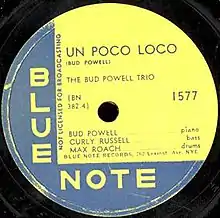Un Poco Loco
"Un Poco Loco" is an Afro-Cuban jazz standard composed by American jazz pianist Bud Powell.[1][2] It was first recorded for Blue Note Records by Powell, Curly Russell, and Max Roach on May 1, 1951.[3][4]
| "Un Poco Loco" | ||||
|---|---|---|---|---|
 | ||||
| Single by Bud Powell | ||||
| from the album The Amazing Bud Powell, Volume One | ||||
| B-side | "It Could Happen to You" | |||
| Released | 1951 | |||
| Genre | Jazz | |||
| Length | 4:42 | |||
| Label | Blue Note | |||
| Songwriter(s) | Bud Powell | |||
| Producer(s) | Alfred Lion | |||
| Bud Powell singles chronology | ||||
| ||||
Musical characteristics
"Un Poco Loco" is in thirty-two bar form.[4] It uses the lydian chords and even uses lydian chords stacked on top of each implying a polytonality (D major 7 over C major 7: CEGBDF#AC#) with the improvisation based on an alternating lydian-ish polytonality and an altered dominant chord.[5]
Legacy
In the late 1980s, the renowned literary and cultural critic Harold Bloom included "Un Poco Loco" in his list of the most "sublime" works of twentieth-century American art (from his introduction to Modern Critical Interpretations: Thomas Pynchon's Gravity's Rainbow).[6]
References
- Yanow, Scott (2000). Afro-Cuban Jazz. San Francisco, C.A.: Miller Freeman Books. p. 188. ISBN 978-0-87930-619-9. Retrieved 13 April 2019.
- Priestley, Brian (1991). Jazz On Record: A History. New York: Billboard Books. p. 99. ISBN 978-0-8230-7562-1. Retrieved 13 April 2019.
- Groves, Alan (2001). The Glass Enclosure: The Life Of Bud Powell (Reprinted. ed.). New York: Continuum. p. 124. ISBN 978-0-8264-4746-3. Retrieved 13 April 2019.
- McCalla, James (1994). Jazz, A Listener's Guide. Englewood Cliffs, N.J.: Prentice Hall. pp. 116, 123, 125, 194. ISBN 978-0-13-097940-7. Retrieved 13 April 2019.
- DeMotta, David J. (2015) The contributions of Earl "Bud" Powell to the modern jazz style. Doctoral dissertation, The City University of New York.
- Kastin, David (2011). Nica's Dream (1st ed.). W. W. Norton. pp. 172, 173. ISBN 978-0-393-06940-2. Retrieved 13 April 2019.